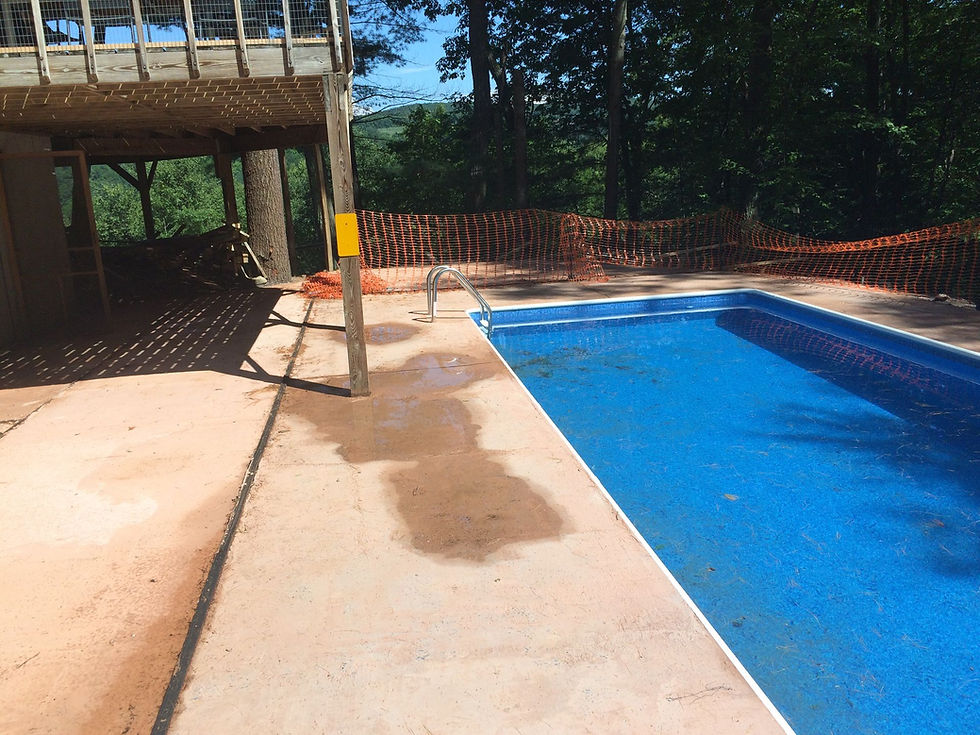Your Pool Is Clean—But Is It Safe?
- Design Team
- Jul 21
- 3 min read
Understanding Water Balance Beyond Just Chlorine
It is easy to assume that if your pool water looks clear and smells faintly of chlorine, it is safe to swim in. But water clarity and chlorine alone do not tell the whole story. The truth is, pool water can look fine on the surface while still being chemically unbalanced—and that imbalance can lead to skin irritation, equipment damage, algae growth, and even health risks.
At The Pool Chemist, we help Hudson Valley pool owners keep their water not just clean, but balanced. Here’s why water balance matters and what to watch for beyond chlorine levels.

The Role of Chlorine—And Its Limitations
Chlorine is the most common sanitizer used in pool water. It kills bacteria and viruses, helps prevent algae, and keeps water safe for swimmers. However, chlorine effectiveness depends heavily on other water chemistry factors.
If your water’s pH or stabilizer levels are off, for example, your chlorine might not work as intended—even if you have the right amount.
That is why chlorine is just one part of a much bigger picture.

The Big Four of Water Balance
To keep your pool water healthy, comfortable, and safe for your equipment, you need to monitor four key components in addition to chlorine:
1. pH Level
pH measures how acidic or basic your pool water is.
Low pH (acidic): Can irritate eyes and skin, corrode metal components, and damage pool surfaces.
High pH (basic): Can cause cloudy water, reduce chlorine effectiveness, and lead to scale buildup.
2. Total Alkalinity
Ideal range: 80 to 120 ppm
Alkalinity helps stabilize your pH levels. If your alkalinity is off, your pH will swing up and down unpredictably.
Keeping alkalinity in range reduces chemical usage and helps maintain a stable pool environment.

3. Stabilizer (Cyanuric Acid)
Ideal range: 30 to 50 ppm for outdoor pools
Stabilizer protects chlorine from being destroyed by UV rays from the sun.
Too little: Chlorine disappears quickly.
Too much: Can “lock up” chlorine, making it ineffective even when it is present.
4. Calcium Hardness
Ideal range: 200 to 400 ppm
This refers to the amount of dissolved calcium in your pool.
Too low: Water becomes corrosive and can damage plaster, tile, and metal fixtures.
Too high: Leads to cloudy water and scale deposits on surfaces and equipment.

Why Balance Matters for Swimmers and Equipment
Balanced water protects more than just your guests—it protects your pool itself. Unbalanced water can:
Shorten the lifespan of pumps, filters, and heaters
Damage vinyl liners or plaster surfaces
Lead to costly repairs or even early equipment replacement
Cause itchy skin, red eyes, and dry hair for swimmers
In short, proper water balance is a critical part of responsible pool ownership, not just a technical detail.
How Often Should You Test Your Pool Water?
During the summer, when your pool is in heavy use and exposed to full sunlight, we recommend testing at least once a week—more often after rainstorms, parties, or heavy bather loads.
At The Pool Chemist, we offer professional water testing and on-site service to help you stay ahead of issues before they become problems. We use precise testing equipment and provide detailed explanations, so you know exactly what’s going on in your water—and how to fix it.
Keeping It Simple with The Pool Chemist
For pool owners in the Hudson Valley region, we make expert-level pool care accessible, reliable, and easy to understand. We bring technical know-how and a straightforward approach, offering services that go beyond skimming and shocking.
If you are not sure your water is properly balanced—or if you are tired of guessing—we are here to help.
Contact The Pool Chemist today to schedule a visit or drop off a sample for testing. Because peace of mind starts with knowing your water is not just clear, but truly clean and balanced.



Comments